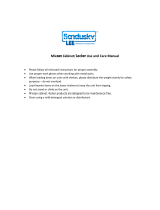
15
ONE YEAR LIMITED WARRANTY
This Whynter Glass Door Freezer is warranted, to the original owner within the 48 continental states, for one year
from the date of purchase against defects in material and workmanship under normal use and service. When
making a warranty claim, please have the original bill or invoice of purchase with purchase date available. Should
your Whynter Glass Door Freezer prove defective within one year from the date of purchase, return the defective
part or unit, freight prepaid (within two months of purchase; after two months to one year, customer will be respon-
sible for freight cost to Whynter’s service department), along with an explanation of the claim to Whynter
LLC. A return authorization number issued by Whynter is required for all warranty claims and returns. Please
package your Whynter Glass Door Freezer carefully in its original packaging material to avoid damage in trans-
it. The original box and packaging material should be retained, as Whynter is not responsible for the cost
of replacement packaging. Under this warranty, Whynter will repair or replace any parts found defective at our
discretion. This warranty is not transferable. After the expiration of the warranty, the cost of labor and parts will be
the responsibility of the original owner of the unit.
THIS WARRANTY DOES NOT COVER:
Acts of God, such as fire, flood, hurricanes, earthquakes and tornadoes.
Improper power supply such as power surge, low voltage, defective household wiring or inade-
quate fuses.
Use in commercial or industrial applications
Damage, accidental or otherwise, to the Whynter Glass Door Freezer while in the possession of a
consumer not caused by a defect in material or workmanship;
Damage caused by consumer misuse, tampering, or failure to follow the care and special han-
dling provisions in the instructions.
Damage to the finish of the case, or other appearance parts caused by wear.
Damage caused by repairs or alterations to the product by anyone other than authorized by the
manufacturer.
Removal, Replacement Packaging, Freight and Insurance cost for the warranty service.
DISCLAIMER OF IMPLIED WARRANTIES; LIMITATION OF REMEDIES CUSTOMER'S SOLE AND EXCLUSIVE
REMEDY UNDER THIS LIMITED WARRANTY SHALL BE PRODUCT REPAIR OR REPLACEMENT AS PRO-
VIDED HEREIN. CLAIMS BASED ON IMPLIED WARRANTIES, INCLUDING WARRANTIES OF MERCHANTA-
BILITY OR FITNESS FOR A PARTICULAR PURPOSE, ARE LIMITED TO ONE YEAR OR THE SHORTEST PE-
RIOD ALLOWED BY LAW, BUT NOT LESS THAN ONE YEAR. WHYNTER SHALL NOT BE LIABLE FOR CON-
SEQUENTIAL OR INCIDENTAL DAMAGES SUCH AS PROPERTY DAMAGE AND INCIDENTAL EXPENSES
RESULTING FROM ANY BREACH OF THIS WRITTEN LIMITED WARRANTY OR ANY IMPLIED WARRANTY.
SOME STATES AND PROVINCES DO NOT AL-LOW THE EXCLUSION OR LIMITATION OF INCIDENTAL OR
CONSEQUENTIAL DAMAGES, OR LIMITATIONS ON THE DURATION OF IMPLIED WARRANTIES, SO
THESE LIMITATIONS OR EXCLUSIONS MAY NOT APPLY TO YOU. THIS WRIT-TEN WARRANTY GIVES
YOU SPECIFIC LEGAL RIGHTS. YOU MAY ALSO HAVE OTHER RIGHTS THAT VARY FROM STATE TO
STATE.
Please retain the original proof of purchase in order to obtain warranty services. War-
ranty begins from the original date of purchase.
To obtain service or information, contact
Whynter LLC via email at support@whynter.com or call
866-WHYNTER.
Product contents and specifications may change without notice.
Copyright © 2017 Whynter LLC
WWW.WHYNTER.COM
V 3.7.2017-1248
















